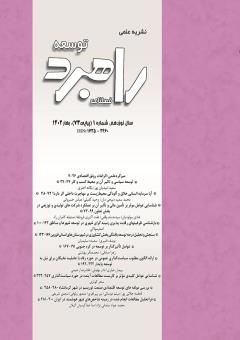ارائه الگوی مطلوب سیاستگذاری عمومی در حوزه رفاه با عاملیت نخبگان برای نیل به توسعه پایدار
محورهای موضوعی :پیمان عیاری 1 , نادر بهلولی 2 , غلامرضا رحیمی 3
1 - 0
2 - 0
3 - 0
کلید واژه: کلمات کلیدی: سیاستگذاری عمومی, رفاه عمومی, عاملیت نخبگان, توسعه پایدار, گراندد تئوری,
چکیده مقاله :
دستیابی به رفاه عمومی تنها از رهگذر سیاستگذاری عمومی با نقشآفرینی نخبگان میسر میشود. مطالعه حاضر نیز با هدف ارائه الگوی مطلوب سیاستگذاری عمومی در حوزه رفاه با عاملیت نخبگان برای نیل به توسعه پایدار صورت گرفت. این تحقیق از لحاظ هدف کاربردی-توسعهای است و از لحاظ ماهیت و شکل اجراء به صورت توصیفی-پیمایشی انجام شده است. جامعه آماری این پژوهش شامل نخبگان سیاستگذاری عمومی است. نمونهگیری با استفاده از روش نمونهگیری نظری صوت گرفت و در نهایت با 11 نفر اشباع نظری حاصل شد. توزیع پرسشنامه محققساخته نیز در میان 384 نفر از مدیران سیاستگذاری عمومی در حوزه رفاه که فرمول کوکران تعیین گردید، به روش تصادفی نمونهگیری انجام شد. ابزار گردآوری دادهها مصاحبه نیمهساختاریافته و پرسشنامه میباشد. جهت تحلیل مصاحبههای تخصصی از روش نظریهپردازی دادهبنیاد (گراندد تئوری) و نرمافزار MaxQDA و جهت اعتبارسنجی الگو نیز از روش حداقل مربعات جزئی و نرمافزار Smart PLS استفاده شده است. براساس مدل پارادایمی پژوهش شرایط علی شامل عوامل اقتصادی، فرهنگی، فنی و تکنولوژیکی است که بر سیاستگذاری عمومی اثر میگذارند. سیاستگذاری عمومی نیز به عنوان پدیده محوری بر ارزیابی اجرای خطمشیهای رفاهی موثر است. در این میان نخبگان شرایط زمینهای را فراهم میآورند از سوی دیگر تضاد منافع در اجرای خطمشیهای رفاهی نیز شرایط مداخلهگر هستند. در نهایت از طریق ارزیابی اجرای خطمشیهای رفاهی دستیابی به توسعه پایدار قابل حصول است.
Ayyari Peyman Bohlooli Nader Rahimi Gholamreza Abstract Achieving public welfare is possible only through public policy with the role of elites. The present study was also carried out with the aim of presenting the ideal model of public policy in the field of welfare with the agency of elites to achieve sustainable development. This research is applied-developmental in terms of purpose, and in terms of its nature and form of implementation, it was done in a descriptive-survey manner. The statistical population of this research includes public policy elites. Sampling was done using the theoretical sampling method and finally theoretical saturation was achieved with 11 people. The researcher-made questionnaire was also distributed among 384 public policy managers in the field of welfare, which was determined by Cochran's formula, by random sampling. The data collection tools are semi-structured interviews and questionnaires. In order to analyze the expert interviews, the grounded theory method and MaxQDA software were used, and partial least squares method and Smart PLS software were used to validate the model. Based on the research paradigm model, causal conditions include economic, cultural, technical and technological factors. that affect public policy. Public policy as a central phenomenon is effective in evaluating the implementation of welfare policies. In the meantime, elites provide background conditions, on the other hand, conflict of interests in the implementation of welfare policies are also interfering conditions. Finally, sustainable development can be achieved by evaluating the implementation of welfare policies.
